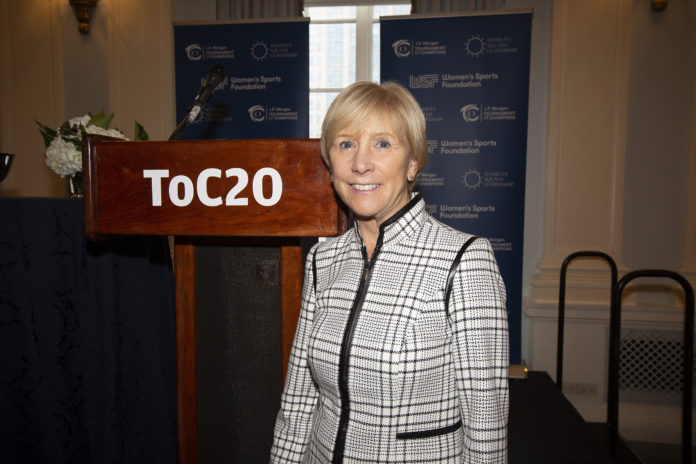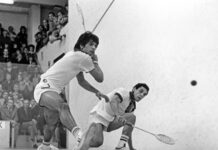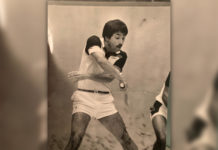It Will Be $2,000
Outside The Glass, the world’s oldest squash podcast, is now in its fifth season. OTG is a radio show with a new episode dropping at the beginning of each month. OTG episodes, produced by US Squash, are available on podcast apps like Apple Podcasts, Castro, Overcast, Pocket Casts and SoundCloud. In episode forty-nine, Melissa Winstanley, the veteran tournament operations director, spoke about the history of the J.P. Morgan Tournament of Champions. (image: Andreas Hofweber)
Outside The Glass: Tell me about the mechanics of running a pro tournament like the ToC in the 1980s.
Melissa Winstanley: Ticketing was definitely all by hand. We weren’t using computers. No cell phones. We were mailing people tickets. We didn’t even have self-licking stamps back then. People would mail in their order for their tickets, and we’d mail the tickets back. We had a map of the venue that was not foolproof. Honestly. At all. Someone would have double tickets. This person had the same seat as that person: “No, problem, come over here.” In the first year [of the Tournament of Champions with a portable court, in 1982] when we had just one glass wall in the back, there were no reserved seats. Once it became multi-walled [in 1983] there were reserved seats.
I was a part of a team. Don Goodwin was huge. He carried it. He carried it with his commentary and his voice. He did all the really important things, massaging the sponsors. John Nimick is taking the court, he would boom out.
We had programs. I worked with a company up there in Toronto. I can remember the first time we did a pixilated program cover. That was fascinating. It was probably 1988. I remember thinking, that was so good, we’ve really come a long way.
We had little ball girls and ball boys—my kids, someone else’s kids, Gordie Anderson’s kids. We didn’t have someone sweeping or mopping the court. That never happened. We didn’t have court attendants. If the ball went out of the court, the little kids would scramble and go get the ball. That was Gul Khan’s favorite stalling tactic. Back then we had two serves. When Gul was winded or bushed, he’d serve the first one out, way out. The ballroom was big and we couldn’t find the ball.
OTG: In 1989 the tournament moved from Toronto down to New York and the World Financial Center. What was that like?
MW: Well, the biggest thing was the palm trees. There were sixteen. We sold obstructed view tickets if a palm tree was in the way. Then people would be pissed off when they didn’t understand what that meant. Zerline [Goodman] would just deal with it in her own good way. She was fantastic.
And the sunlight was coming in. I went to a theatre company and found a black velvet drape. We did it six years at the World Financial Center.
One of the most unique things we did there was bring the juggler and performance artist Michael Moschen for a pre-finals event. He used the squash court and squash balls to create a cascading performance art show. He created a pattern with all these balls in the air and kept it going. It was so cool.
OTG: What about moving to Grand Central in 1995?
MW: We had to get air-conditioning because the first one was in June. We had to park a temporary HVAC truck up on the viaduct and bring it down through silver-foil tubes through the windows. We also dimmed the chandeliers. It was $2,000. That was where we coined the phrase, “it will cost $2,000.” There isn’t anything that doesn’t cost less than that. We need more catering: “It will be $2,000.” We need more signs: “$2,000.” I got the electrician to show me how to do the chandeliers, back in this warren. I would dim them and bring them up when the match was over. I was in complete control of the lighting.
We used to bring bags and bags of extension cords, telephone cords, lamps, telephones to the Tournament of Champions. We would literally go around on the floor and pull up one of the brass weighty electrical outlet protectors and stick something in and see if it worked. Every other phone socket didn’t work. We needed three landline phones for the box office. Zerline would have three phones there, three phones going at the same time. It was all by hand. She was amazing. But also in the VIP area, like a hotel lobby, we wanted phones so you could sit down in an armchair and make a call. We hadn’t figured out the phone bill. After the first ToC in 1995, we got a phone bill for $1,700 for calls people were making. The players were calling Pakistan. We had no idea.





